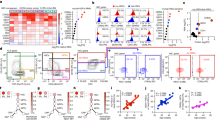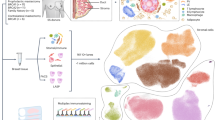Abstract
Studies of the differentiation of human haematopoietic cells have been greatly advanced by the use of in vitro cloning techniques to enumerate the myeloid and erythroid progenitor cells which form colonies in semi-solid medium1–3. The granulocytic/monocytic colony-forming cells (CFU-GM) and erythroid burst-forming cells (BFU-E) are thought to be mononuclear cells, similar in size to medium size lymphocytes, but their ontogenetic relationship to other progenitor cells and the putative pluripotential stem cell remains obscure4,5. This is partly because elucidation of parent-progeny relationships requires the isolation of precursor cells before they acquire mature phenotypic characters. Physical methods have failed to separate CFU-GM cleanly from other cells because of their heterogeneity, and immunologically specific markers for human progenitor cells have not been reported6,7. We report here that a fraction containing all the granulocytic/monocytic and erythroid progenitor cells, as well as cells which may be lymphoid progenitors, can be isolated from bone marrow using a combination of monoclonal antibodies.
This is a preview of subscription content, access via your institution
Access options
Subscribe to this journal
Receive 51 print issues and online access
$199.00 per year
only $3.90 per issue
Buy this article
- Purchase on Springer Link
- Instant access to full article PDF
Prices may be subject to local taxes which are calculated during checkout
Similar content being viewed by others
References
Pike, B. L. & Robinson, W. A. J. cell. Physiol. 76, 77–84 (1970).
Axelrad, A. A., McLoed, D. L., Shreeve, H. M. & Heath, D. A. Haemopoiesis in Culture (ed. Robinson, W.) 226–234 (Washington US Government Printing Office, 1974).
Iscove, N. N., Sieber, F. & Winterhalter, K. H. J. cell. Physiol. 83, 309–320 (1974).
McCulloch, E. A., Mak, T. W., Price, G. B. & Till, J. E. Biochim. biophys. Acta 355, 260–299 (1974).
Metcalf, D. Clin. Haemat. 8, 263–285 (1979).
Cline, M. J. & Billings, R. J. exp. Med. 146, 1143–1145 (1977).
Janossy, G., Frances, G. E., Capellaro, D., Goldstone, A. H. & Greaves, M. F. Nature 276, 176–178 (1978).
Kohler, G. & Milstein, C. Eur. J. Immun. 6, 511–519 (1976).
Beverley, P. C. L. Proc. XI Int. Course Transplant Clin. Immun., 87–94 (Excerpta Medica, Amsterdam, 1980).
Bradstock, K. F. et al. J. natn. Cancer Inst. 65, 33–42 (1980).
Testa, N. G. Clin. Haemat. 8, 311–333 (1979).
Greaves, M. F. & Janossy, G. Biochim. biophys. Acta 516, 193–230 (1978).
Burgess, A. W., Wilson, E. M. A. & Metcalf, D. Blood 49, 573–583 (1970).
Iscove, N. N. Cell Differentiation and Neoplasia (ed. Sanders, G. F.) (Raven, New York, 1978).
Nathan, D. G. et al. J. exp. Med. 147, 324–329 (1978).
Author information
Authors and Affiliations
Rights and permissions
About this article
Cite this article
Beverley, P., Linch, D. & Delia, D. Isolation of human haematopoietic progenitor cells using monoclonal antibodies. Nature 287, 332–333 (1980). https://doi.org/10.1038/287332a0
Received:
Accepted:
Published:
Issue Date:
DOI: https://doi.org/10.1038/287332a0
Comments
By submitting a comment you agree to abide by our Terms and Community Guidelines. If you find something abusive or that does not comply with our terms or guidelines please flag it as inappropriate.



